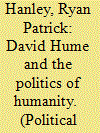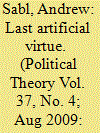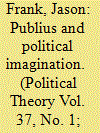| Srl | Item |
| 1 |
ID:
103754


|
|
|
|
|
| Publication |
2011.
|
| Summary/Abstract |
Recently a call has gone up for a revival of the "politics of humanity." But what exactly is the "politics of humanity"? For illumination this paper turns to Hume's analysis of humanity's foundational role in morality and modern politics. Its aims in so doing are twofold. First, it aims to set forth a new understanding of the unity of Hume's practical and epistemological projects in developing his justifications for and the implications of his remarkable and underappreciated claim that humanity is the only sentiment on which a moral system can be founded. Second, by attending to Hume's substantive definition of humanity and its relationship to benevolence and sympathy in particular, it aims to clarify the relationship between the principal elements of the politics of humanity: "humanism" or secularism, "humane" or other-directed values, and mutual recognition of our shared "humanness."
|
|
|
|
|
|
|
|
|
|
|
|
|
|
|
|
| 2 |
ID:
090133


|
|
|
|
|
| Publication |
2009.
|
| Summary/Abstract |
David Hume's position on religion is, broadly speaking, "politic": instrumental and consequentialist. Religions should be tolerated or not according to their effects on political peace and order. Such theories of toleration are often rejected as immoral or unstable. The reading provided here responds by reading Hume's position as one of radically indirect consequentialism. While religious policy should serve consequentialist ends, making direct reference to those ends merely gives free reign to religious-political bigotry and faction. Toleration, like Hume's other "artificial virtues" (justice, fidelity to promises, allegiance to government), is a universally useful response to our universal partiality-as Established uniformity, however tempting, is not. This implies that toleration can progress through political learning, becoming broader and more constitutionally established over time. A sophisticated Humean approach thus shares the stability and normative attractiveness of respect- or rights-based arguments while responding more acutely and flexibly to problems the former often slights: antinomian religious extremism; underdefined political agency; and internationalized, politicized religious movements.
|
|
|
|
|
|
|
|
|
|
|
|
|
|
|
|
| 3 |
ID:
085893


|
|
|
|
|
| Publication |
2009.
|
| Summary/Abstract |
The Federalist is commonly read as an exemplar of political realism. However, alongside Publius' arguments against the enthusiastic imagination- its tendency to inflame the passions, betray the intellect, and subvert political authority-are formative appeals to the imagination's role in reconstituting the public authority shaken during the postrevolutionary years. This essay explores three central aspects of Publius' restorative appeal to the imagination: the appeal to the public veneration required for sustaining political authority across time; the strategies for shifting citizen loyalty from the state and local level to that of a newly energized federal government; and the rhetorical elicitation of the public's imagination in aestheticized portrayals of Providential nationality. These aspects of Publius' argument make up the core of The Federalist's aesthetics of (self) rule. In each instance, Publius invokes the imagination as a heteronomic support to navigate familiar dilemmas of democratic self-authorization.
|
|
|
|
|
|
|
|
|
|
|
|
|
|
|
|